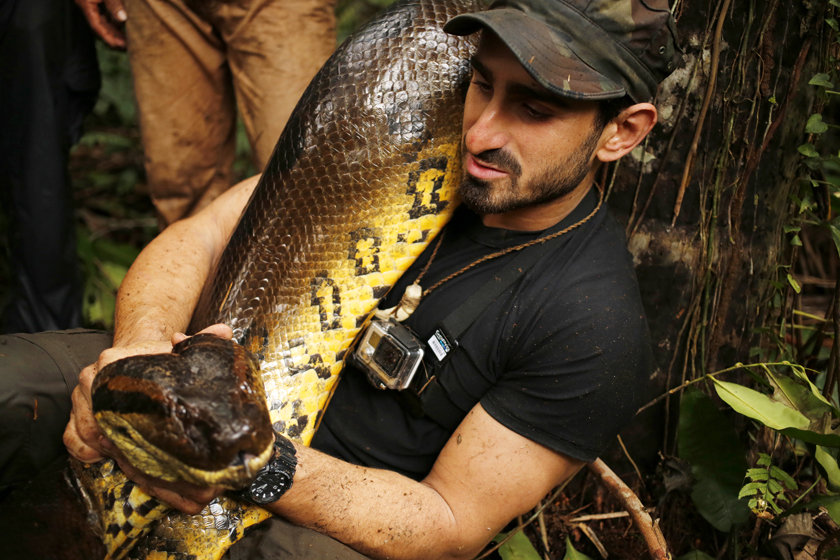Discovery Should Wrestle Conscience, Not Snakes
By Vicki Croke
I’ve always loathed the kind of “animal reporting” in which “naturalists” wrestle and harass wild animals.
Clearly I’m not alone, at least that’s what I’m hearing in the case of a Discovery Channel show that aired this past Sunday. I guess this one went too far. Or maybe the disgust at these kinds of shows has been cumulative. But lots of people, including a few distinguished voices for science, are speaking out.
In this undated image released by the Discovery Channel, naturalist Paul Rosolie from the special “Eaten Alive,” poses with a snake. The program drew more than 4 million viewers on Sunday, Dec. 7. (AP Photo/Discovery Channel, Mohsin Kazmi)
The show in question was called “Eaten Alive.” It promised to exhibit a man named Paul Rosolie in a special protective “snake-proof suit” going down the gullet of a wild anaconda in the Amazon. The show did not make good on its promotion. Sure, Rosolie did roll around in the mud with a big anaconda, which he had in his own words “provoked.” But he halted the stunt when the snake was hurting his arm. And that caused one kind of outrage.
According to Lisa Winter, writing in IFLScience!,
“…thousands of people took to Twitter to express outrage that there wasn’t a man eaten by an anaconda” though the writer says, “it’s probably for the best.”
Yes. And the whole idea of tormenting a wild snake to boost ratings (Discovery’s best in years) caused a different kind of outrage.
Before the show even ran, on his popular public Facebook page, the brilliant primatologist Frans de Waal linked to a story in which a biology professor explains why he refused to participate in the show. And de Waal himself blasted Discovery:
Then, on Monday, after the show had aired, de Waal wrote a new post: “This was a bad idea from start to finish.” In the comments section, people responded with like-minded opinions. Such as:
Conservationist my fanny! More like narcissist. He should be in jail, and the network boycotted.
[And]
I am so fed up with “documentaries” pretending to be nature documentaries, when they’re only about the people making thi[s] so-called documentary, instead of the subject. It’s so meta, and cheap!
[And]
It’s about time a scientist stepped up and explained what is wrong with this ridiculous show, the network airing it and this guy who claims to be a naturalist and wildlife lover. #BoycottEatenAlive.
[And]
Was the snake ok in the end? Discovery channel lost their senses. They went from education to unethical entertainment.
[And]
Feed him to a great white shark instead.
The show has received a great deal of well-deserved online mocking.
One of the best takes on the fiasco appeared yesterday. The Washington Post carried an extremely thoughtful and well-informed look at the show and the trend that it’s part of.
The story, written by Chris Palmer, director of American University’s Center for Environmental Filmmaking (his book “Confessions of a Wildlife Filmmaker” will be published in March) and filmmaker Shannon Lawrence carried this sub-headline:
False advertising wasn’t the worst sin in the “Eaten Alive” publicity stunt.
The authors write:
Animal harassment for the sake of entertainment is one of the most troubling ethical issues in wildlife filmmaking, and one that is increasingly common with the advent of nature reality television shows.
They point out that filmmakers sometimes pass off sequences that use captive animals as being shot in the wild, and very often demonize animals such as sharks. But, of the offenses committed by some filmmakers, they say,
…animal harassment is particularly troubling because it will, by definition, distress the animal and even injure it. Justifying animal harassment in the name of conservation or awareness of environmental issues is unethical, yet pervasive in the industry. It’s also challenging to combat because most of the cruelty happens out in the field, with no witnesses.
Producers, Palmer and Lawrence say, excuse their actions through a kind of “greenwashing.” They pretend that these misdeeds are justified because they claim that in the end they help raise conservation awareness.
Ha!
As the writers point out:
If “naturalists” like Rosolie and “environmental authorities” like Discovery Channel and Animal Planet fail to demonstrate appropriate respect towards wildlife, why would the general public?”
Exactly.


One Response to “Discovery Should Wrestle Conscience, Not Snakes”
The only thing that troubles me more than the abuse of this magnificent (though really, really scary) creature, is the fact that there is a market for this sort of “entertainment” at all. What in the world has humankind come to? Humanunkind?!
Comments are closed.